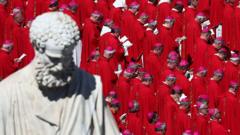As the Vatican gears up for one of its most secretive gatherings, 133 cardinals will convene later this week in the Sistine Chapel to elect a successor for Pope Francis. Each cardinal has pledged to uphold an oath swearing lifelong secrecy about the proceedings, creating an impenetrable wall around this pivotal election.
In addition to the cardinals, everyone present within Vatican walls—such as the medical staff and dining personnel—must also adhere to strict confidentiality. The chapel, along with associated guesthouses, will undergo thorough sweeps for any surveillance devices. "Electronic jammers will be employed to prevent any external signals from being received or sent," explained John Allen, editor for Crux news agency. He added that the Vatican approaches this isolation with utmost seriousness.
This lockdown isn't merely about confidentiality; it also serves to prevent malicious attempts to coerce or disrupt the election process. The atmosphere is one of total disconnection; for the duration, cardinals must surrender all electronic gadgets. "The Vatican enforces a 'trust but verify' policy," Allen said, while Monsignor Paolo de Nicolo mentioned, "There are no televisions, newspapers, or radios allowed—detachment from the outside world is complete, even the windows are kept closed."
Assurance of absolute compliance is vital, as violating the confidentiality oath risks excommunication from the Church. As Monsignor De Nicolo noted, "No one dares break these rules."
In stark contrast, speculation around potential successors to the papacy is rampant prior to the conclave. Since the passing of Pope Francis, media outlets and curious onlookers have engaged in extensive "cardinal-hunting," attempting to uncover alliances and strategies. The Italian press has even reported on their dining habits, dubbing their gatherings “Wine and Rigatoni: the Cardinals' Last Suppers,” indicating the unique dynamics leading up to the conclave.
With roughly 250 cardinals in Rome—though only those under 80 are eligible to vote—there is a frenzy of activity around the Vatican. Journalists actively pursue insights from cardinals as they arrive for discussions, but many remain tight-lipped, only reiterating the need for unity amidst the candidates.
"This is a spiritual decision," emphasized Ines San Martin from the Pontifical Mission Societies in the US, reflecting the belief that guidance comes from the Holy Spirit rather than political maneuvering. However, the individual elected will lead a significant institution with enormous global influence, making the decision far-reaching.
From potential favorites facing scrutiny to persistent media lobbying, the process of electing a new pope influences more than just ecclesiastical matters. The wide range of backgrounds in the new cardinal cohort complicates external influence as many lack familiarity with one another, making it difficult for interest groups to assert their agendas.
As the conclave approaches, all cardinals will soon be inside the Vatican, where they will be stripped of their devices and shielded from the media and public interest. The focus will shift entirely to the personal convictions among the electors, fostering discussions that could lead to an unexpected and inspiring choice for the future of the Catholic Church.



















